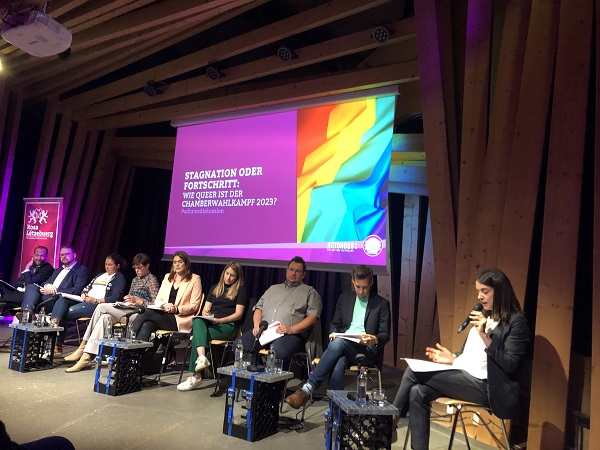 Credit: Otilia Dragan/Chronicle.lu
Credit: Otilia Dragan/Chronicle.lu
On the evening of Tuesday 3 October 2023, Rosa Lëtzebuerg organised a round table event to take stock of LGBTIQ+ issues outstanding for Luxembourg’s legislative election campaign; the event took place at the Rotondes in Luxembourg-Bonnevoie.
Journalist Isabel Spigarelli moderated the discussion, which had members of various political parties in Luxembourg represented: Maxime Miltgen from LSAP, Barbara Agostino from DP, Jessie Thill from the Greens (déi Gréng), Christian Weis from CSV, Line Wies from the Left (déi Lénk), Alex Penning from ADR, Jerry Weyer from the Pirate Party (Piraten) and Yannick Craveira from FOKUS.
The discussion’s main points were those of family, transgender and intersex issues.
Altruistic surrogacy was one of the demands of Rosa Lëtzebuerg , of which only DP and Déi Lenk were clearly in favour. DP expressed concern over it potentially turning into a “commercial business” and the need of having a type of compensation for the time the surrogate mother will be unable to work. The Déi Gréng were only partly in favour; their representative expressed worries about potential “abuses” that may occur, and said there were multiple complications regarding certain “ethical and medical questions regarding women’s bodies”. LSAP and FOKUS did not exclude the possibility for it but did not express a wish to prioritise the issue, naming a “potential for abuses” and “lack of data”, respectively.
Another issue was that of Medically Assisted Reproduction (MAR) being fully covered by the CNS for all aspiring parents regardless of gender and sexual identity. Déi Gréng, Déi Lénk, Piraten and FOKUS were all clearly in favour of this, while CSV and ADR were positioned against it and DP did not give a clear answer. The Piraten party representative expressed the necessity of case-by-case reimbursement according to individuals’ specific needs and criteria (for example, trans men may be able to be reimbursed for the costs of medically assisted reproduction).
The next point in the discussion was that of the automatic recognition of both parents, independent of their legal relationship. The non-birthing parent does not have a legal status of parent unless they are married to the birthing parent, and have to apply for adoption of their child, which takes around three months. During this waiting time, they do not have a right for parental leave. DP, Déi Gréng, CSV, Déi Lénk, Piraten and FOKUS were clearly in favour of automatic parental recognition, whilst ADR was against it. ADR’s representative noted his party wants to defend the “child’s best interest” first and foremost but that they believe, based on studies, that children need a “masculine and a feminine pole positions”. Most other parties such as Déi Lénk and Déi Gréng, but also LSAP objected to this, stating that “children need parents who take care of them” and that our heteronormative system makes it so that children will always have masculine and feminine people around them and a wider network, that they will not “live in isolation”. ADR did not believe there was a real need to create a law around this situation as it as it may not occur often enough. Finally, the ADR representative said they would not “completely exclude” this possibility should it be necessary for a child’s well-being.
Concerning gender identities, a main issue was that of making transgender healthcare widely available and covered by the CNS, to which DP, Déi Gréng, Déi Lénk, Piraten and FOKUS agreed, though CSV positioned itself reluctant to agree for the CNS to cover these costs without further medical investigation. The moderator pointed out that this would be a “repathologising” effect.
Regarding intersex children, the question of forbidding unnecessary (not “vitally important”) surgeries came up, of which DP, Déi Gréng, Piraten and FOKUS were in favour. CSV was against this. Déi Lénk expressed concern at the fact that there is no legal definition of what a “vital necessity” would be in the law, which would need to be rectified first.








